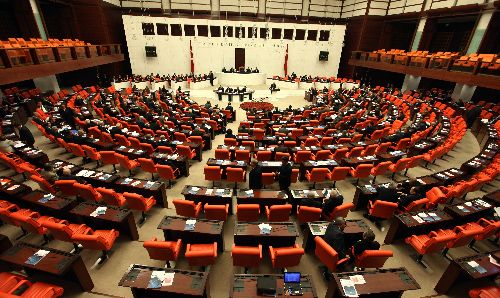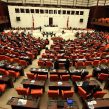
Kurdish Problem Dominates Election Process in Turkey
Publication: Eurasia Daily Monitor Volume: 8 Issue: 82
By:

As Turkey prepares for the parliamentary elections slated for June12, tension in the country has intensified. The decision by the Supreme Election Board (YSK), to bar many pro-Kurdish independent candidates which have sparked a major political debate as well as street demonstrations, underscoring the challenges the unresolved Kurdish issue presents to mainstream Turkish politics.
On April 18, the YSK issued a decision which disqualified twelve independent candidates from running in the elections, based on past convictions and legal technicalities in their applications. Seven of the rejected candidates were running on the list backed by the pro-Kurdish Peace and Democracy Party (BDP) (Anadolu Ajansi, April 18). Given the election threshold, the BDP will not run in the elections but will support independent candidates.
Turkey’s rather high election threshold of 10 percent has been a major challenge to smaller political parties. It has long been on the agenda of Turkish politics to lower this threshold, because it creates a democratic representation deficit. Although many parties pledged to end this undemocratic practice, major parties did not take concrete steps in that direction. Despite its earlier promises, the governing Justice and Development Party (AKP) also resisted pressure to lower the election threshold, arguing that it would undermine political stability. In the AKP’s view, if many parties were to be represented, it would not be possible to form a single party government. The election threshold was also on the agenda in the run up to the referendum on the constitutional amendment package held in September 2010. The BDP did not support the constitutional reforms, due partly to the AKP’s refusal to lower the election threshold (EDM, September 20, 29, 2010).
For many years pro-Kurdish parties failed to gain seats in the Turkish Parliament because of the election threshold. This situation has presented a major challenge to Turkish politics, as pro-independence Kurdish views could not be represented in parliament. In the 2007 parliamentary elections, the BDP’s predecessor DTP changed its strategy and decided to nominate independent candidates in its strongholds. Consequently, it won over 20 seats, enough to form a group in parliament. Following the same strategy, the BDP was planning to obtain around 30-35 seats, but the recent decision presents many challenges to its plans.
As the BDP is evaluating how to proceed following the YSK’s decision, the BDP head Selahattin Demirtas threatened to boycott the elections. A possible withdrawal of the BDP might have serious political and security repercussions. Such a move could spark clashes and demonstrations, as well as the Kurdistan Workers’ Party (PKK)’s escalation of its terror campaign to destabilize the region. In Southeast Anatolia, it could create significant risks for the physical security of the election process. Moreover, non-representation of the BDP might throw serious questions over the democratic legitimacy of the Turkish parliament, as the Turkish government plans to write a new constitution following the elections.
On April 19, there were many demonstrations in Istanbul, Diyarbakir, Hakkari and other predominantly Kurdish-speaking towns. Throughout the night, demonstrations continued in some cities such as Adana. The demonstrators attacked several government buildings, banks, public transportation busses, and offices, as well as setting fires on the streets. The police tried to suppress the demonstrators by using tear gas, pepper spray and water cannons, while making several arrests (www.cnnturk.com, April 19). The demonstrations were indicative of the things to come, if this crisis is not managed.
The YSK decision, thus, shook the political agenda in Turkey. BDP representatives went as far as implying that the government instructed the YSK to bar the independent candidates, so that it could undermine the challenge presented to AKP by the BDP. The CHP reacted harshly to the YSK’s decision. CHP called for an extraordinary meeting of the Turkish Parliament to discuss the YSK decision and if necessary to pass legislation to correct this situation. However, the AKP immediately dismissed this proposal, while the MHP also expressed a negative opinion on it. While some AKP members criticized the YSK decision on democratic grounds, AKP representatives stressed that the YSK is an independent legal body and that it would not be right to associate it with the government. Government spokespeople emphasized that they would not cancel the elections while any constitutional changes at this stage could not be implemented (www.cnnturk.com, April 19).
Nonetheless, despite the YSK’s claim that it merely issued a legal decision, many elements of the decision have been legally debated, which is partly the reason why many analysts and politicians strongly criticized the YSK. For instance, the YSK did not approve the application of one candidate who is currently serving in parliament. Moreover, while the YSK rejected one candidate’s application, on the grounds of a political crime from the 1970’s, it approved the application of another candidate who was also tried in the same case, and was in the same legal category. More importantly, the Turkish press argued that the YSK committed a grave legal error in its decision. Instead of the new penal code that went into force in 2005, the YSK applied the provisions of the older code. Since the new regulations automatically restore political rights of past convicts, the lower courts no longer issue documents showing that a person’s rights have been restored. Arguably, short of such documents, the YSK did not conduct a proper inquiry on the candidates’ eligibility, hence gave the controversial decisions (Milliyet, April 20).
In response to mounting criticism, YSK head Ali Em rejected the charges that the YSK’s decision was a political one, noting that YSK is not a political institution. Earlier on April 19, an officer from the YSK noted that if the rejected candidates could furnish missing documents, the YSK could reconsider their case. Em clarified that the rejected candidates should submit documents showing their political rights were restored within the legally sanctioned appeal time (Anadolu Ajansi, April 19). However, in the absence of an authority to issue such documents, it remains uncertain as to how this issue will be resolved.
BDP head Demirtas said they would submit new documents, but emphasized that they still retain the option of withdrawing from the elections, depending on the revised decision of the YSK. Nonetheless, according to press reports, only three of the seven rejected candidates could pass the second examination by the YSK (Haberturk, April 20), raising questions as to how the crisis might be resolved without deepening existing divisions.




